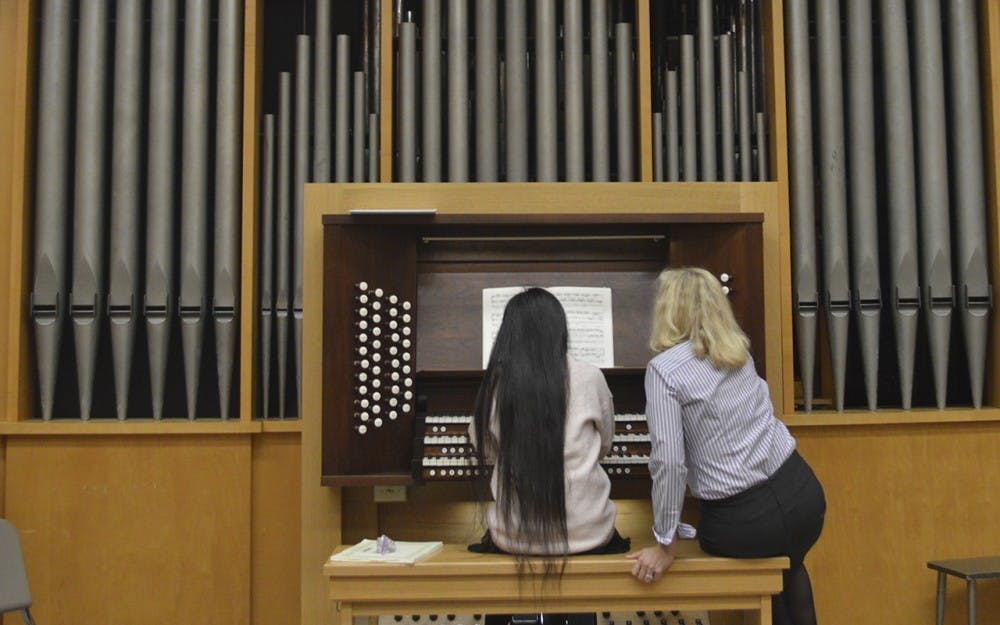In an inconspicuous room on the top floor of the Music Annex building lies a pipe organ. To the outside world, this is a mere room, but it also happens to be where professor Janette Fishell gives lessons as chair of the Department of Organ and Sacred Music Studies, one of the most prestigious of its kind.
In an email, she said her department is small relative to the rest of the music school, but compared to other institutions, it is one of the largest in the world. Every year 30 to 40 full-time organ majors and several graduate students work on their transitions from students to professionals.
“Like most organists, my first exposure to the pipe organ was at church, and I always knew that some combination of performing, teaching and sacred music would be my vocational calling,” Fishell said.
Fishell said she enjoys a mix of undergraduate and graduate students because they learn from each other in different ways, varying on experience and repertoire.
“This year in my studio we have four first-year students, so that bodes well for the health of our undergraduate student population,” Fishell said. “From a personal standpoint, I love teaching undergraduate students because one has the opportunity to help them with the most important part of their education — building the foundation of technique and musicianship that will undergird everything they will do for the rest of their careers.”
Fishell may be preparing her students for successful career paths, but her task is equally to maintain one of the country’s, if not the world’s, largest and most accomplished sacred music departments.
Organ students are required to learn and perform choral music, but they also take classes like C405: Organ Construction and Design, which give them insight into the instrument that they play, regardless of their skill level or time playing.
Students are required to take two years worth of sacred music studies classes as part of the curriculum. Fishell said this prepares them for the role of church music director, a popular career path for those who study organ performance.
While most of the undergraduate students will go on to play in churches, Fishell said the department tries to expose them to varying cultures and media forms.
“We have many students who come from cultures or church backgrounds where the pipe organ is not part of the scene, and I think it is very cool that these students just fell in love with the organ as an instrument apart from any church music connotations,” Fishell said.
On the other hand, graduate students do not have to come from music-intensive backgrounds to succeed. One of the department’s new graduate students, Steven Smith, played kicker for the football team at Heidelberg University.
Yumiko Tatsuta, a first-year graduate student in the department, said like Fishell, she was introduced to organ music in a church. Tatsuta is a student from Japan, where she said organ music is not very prominent, but she was given the task of learning the instrument for her Catholic school’s chapel.
She said she started playing piano at the age of 3, but learning to play preludes and other organ pieces for her middle and high school mass services was still highly challenging. After practicing for a few years, she decided playing the organ was her desired career path.
Tatsuta first met Fishell while she was studying in Stuttgart, Germany, and Fishell was on sabbatical. Tatsuta had already finished a master’s degree in Tokyo before going to Germany.
The two, having been connected by a mutual friend, exchanged emails previously, but actually meeting Fishell cemented one thing in Tatsuta’s mind: She needed to come to IU.
“Unfortunately, in Japan this school is not very well known yet,” Tatsuta said. “It’s my wish to get more international students, especially from Japan, to come here.”
Organ students meet individually with faculty to refine their craft, but Tatsuta said the studio class she takes with her fellow organ students every Tuesday is very beneficial to her learning.
“It’s a time where we can all bring our own repertoire and share it by playing in front of everybody,” Tatsuta said.
She said learning under Fishell is a privilege that cannot be found anywhere else in the world, and she added that the department itself also deserves recognition for the resources it provides for students.
Tatsuta said the school she studied at in Stuttgart had about five organs on hand for students, a collection which was considered one of the larger organ collections in Europe. The Jacobs School of Music alone boasts ten practice organs, 16 including ones like those located in Alumni and Auer Halls.
Tatsuta said she plans to pursue her doctorate once her English language test scores improve. In the future, she aspires to have a career similar to Fishell’s. She admires her mentor’s ability to balance her time between instruction and professional performance.
Along with chairing the sacred musics department, Fishell manages to drive back and forth weekly between Bloomington and her church in Indianapolis to fulfill her role there as choir master and organist.
“I wake up every day so appreciative that I am able to do all three of those things — teaching here, playing recitals in some exciting places and directing the choir and playing the organ at the Episcopal Church of All Saints in Indianapolis,” Fishell said.




